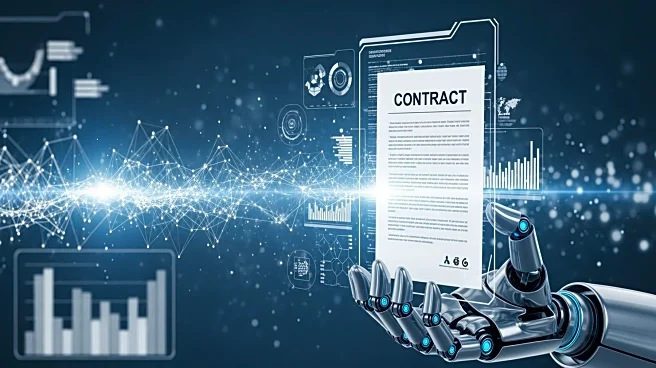What's Happening?
Vultron, a software company, has introduced an artificial intelligence (AI) tool designed to automate the creation of proposals and compliance documents for companies seeking federal contracts. The software,
showcased at the Association of the United States Army (AUSA) conference, aims to reduce the time required for defense contractors to prepare compliant and competitive proposals. According to Mac Liu, founder and CEO of Vultron, the software can significantly cut down the initial preparation time from weeks to a single day by automating manual tasks such as creating compliance matrices and drafting initial versions of proposals. Vultron's AI capabilities are tailored to understand both company-specific documents and federal compliance requirements, making it a valuable tool for companies of all sizes, particularly smaller firms that lack extensive processing infrastructure.
Why It's Important?
The introduction of Vultron's AI software is significant for the defense industry, as it addresses the complex and time-consuming nature of federal contracting. By streamlining the proposal process, Vultron enables companies to focus on strategic elements rather than administrative tasks, potentially increasing their chances of securing contracts. This innovation is particularly beneficial for smaller companies that may not have the resources to efficiently manage compliance and proposal drafting. The software's ability to understand and benchmark open solicitations enhances its utility, offering a competitive edge in the federal contracting space. As defense spending continues to be a critical component of U.S. government expenditure, tools like Vultron could play a pivotal role in shaping the industry's future.
What's Next?
As Vultron continues to refine its AI capabilities, it may expand its customer base beyond the defense sector, potentially offering its services to other industries that require federal contracting. The software's success at the AUSA conference could lead to increased adoption among defense contractors, prompting further development and integration of AI in federal contracting processes. Stakeholders, including large defense companies like Siemens and Viasat, may explore additional applications of Vultron's technology to enhance their operational efficiency. The ongoing evolution of AI in business processes suggests that Vultron's approach could inspire similar innovations across various sectors.
Beyond the Headlines
The deployment of AI in federal contracting raises questions about the ethical implications of automation in decision-making processes. While Vultron's software enhances efficiency, it also underscores the need for transparency and accountability in AI-driven systems. As AI becomes more prevalent in business operations, companies must navigate the balance between technological advancement and ethical considerations, ensuring that automated processes do not compromise the integrity of federal contracting.











